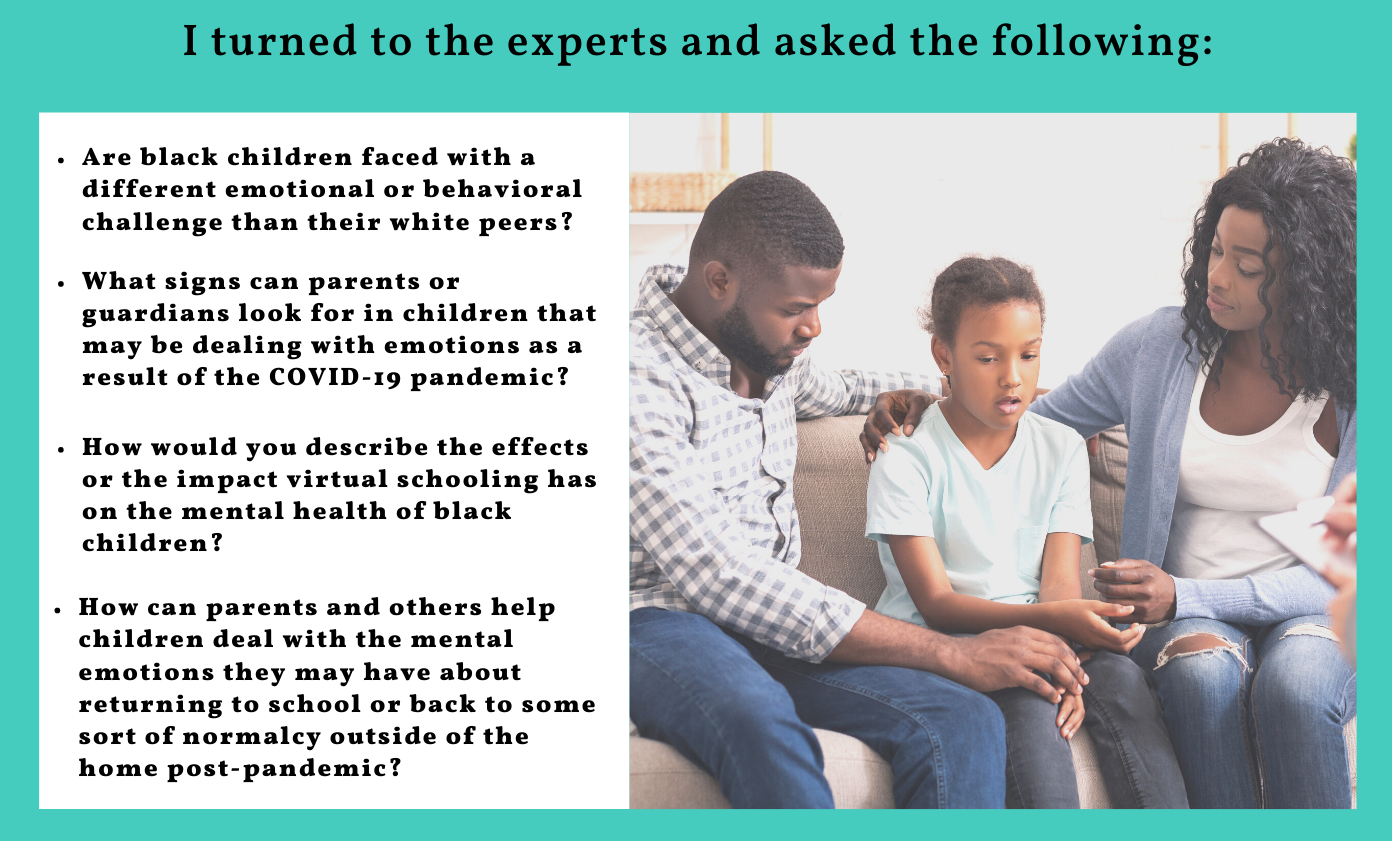
How can parents recognize and help children deal with the mental emotions it has caused?
We all have and many still are feeling the effects of the COVID-19 pandemic and it has absolutely been a challenging time for families, but especially hard on families with school-age children.
It’s been over a year in virtual/remote schooling and our babies are tired, weary, and in some cases failing at school. Given the ‘stereotypical’ challenges many of our black and brown children face in their communities, how do we recognize, acknowledge and help them deal with the mental emotions of the past year and anxiety about the future and returning to school?
On a quest to find some answers, I’ve spoken with parents and a few experts in the field of child psychology and therapy. Children may be feeling new worries about changes in school routines, staying away from gems, or separation from being home this past year. Many families have lost loved ones, so the family dynamics are different – how do parents help children comb through their feelings?

Kisha Howard, M.S., LPC | Child Psychotherapist and Owner, Victory Counseling Group, Allen, TX
In my work with children, those that have experienced the greatest emotional and or behavioral challenges are those living in lower socioeconomic backgrounds, single-parent homes, or dual-parent homes with little outside support regardless of race. In these environments, children may exhibit increased frustration, inability to focus, boundary testing, clinginess, attention seeking, and changes in mood. It’s important that parents and caregivers provide emotional safety, consistency with boundaries, conscious discipline, and always reassure physical safety. These things will increase feelings of security in children, especially during this uncertain time.
It’s a fact that virtual school has increased the levels of stress, feelings of hopelessness, and frustration in children. Black children with limited access to technology have caused many to fall behind their peers. The home can be conducive or a hindrance to your child’s virtual school experience. Parents should access if there are other factors impacting school habits like increased home responsibilities, or distractions.
The best way to help children overcome their fear of returning to school post-pandemic is to normalize their emotions. This is a scary time, and their feelings are valid. Provide age-appropriate facts. Be curious. Ask your child questions like: how can I make this feel less scary for you? or what are you most afraid of? Find information together so that you can discuss your findings as a family. Try reaching out to others whose children have already returned to school. Being knowledgeable can help to reduce feelings of stress and anxiety that you may also be unknowingly passing on to your children.
Lateshia Milton, DSW, MSW, M.Ed. and School Social Worker and Clinical Outpatient Therapist | Tampa, FL
As a mom to two children (boy and girl) and a public school social worker, yes, I believe black children are faced with different emotional or behavioral challenges than their white peers because their experiences as black children are different. Black children often have to deal with issues of poverty, trauma, and caring for themselves or younger siblings at higher rates than their white peers. Furthermore, having emotions is not a topic discussed often in black families. Therefore, black children don’t understand what emotions are and how to properly express and address them. Because of this, we see higher amounts of “behavioral” challenges in minority children as compared to their white peers.
Parents should absolutely be aware of signs and the changes children may go through as a result of the pandemic. Some signs can include increased irritability or mood swings. Check for withdrawing from activities that they would usually be involved in, expressing a heightened fear or worry, increased complaints about going to school, and changes in eating or sleeping habits. It is important to pay attention to these things because they can lead to suicide ideation and cutting behaviors, which have increased amongst school-aged children since the start of the pandemic.
In regards to virtual schooling impacts, it has taken students away from their typical physical activity and opportunities for face-to-face socialization with peers. This is the socialization that they don’t often get at home. It has led to the increased stress that some of our black students don’t know how to express or communicate. Because of this, we are seeing a higher number of cases of anxiety and suicide ideation. This stress is leading to cognitive and social/emotional impairments.
I can’t stress enough that the first thing moms and dads can do is to recognize changes and symptoms their children may be displaying. The second thing I would suggest is to communicate those changes with the child’s pediatrician and support staff (school counselor, social worker, or psychologist) at the school. This will allow for collaboration in making sure a plan that works towards helping them adjust is put into place.